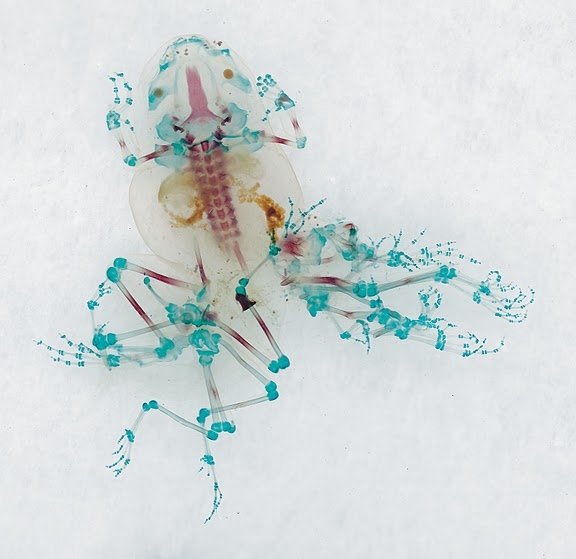The Case of the Deviant Toad
dal 14/3/2010 al 30/3/2010
Segnalato da
14/3/2010
The Case of the Deviant Toad
Royal Institution of Great Britain, London
The artist, activist and ecological researcher, Brandon Ballengee brings his startling high-resolution scanner photographs, video and preserved specimens of deformed toads for his solo exhibition. The show presents the outcome of the artist's 'Ecoactions' and study commissioned by The Arts Catalyst and Yorkshire Sculpture Park. Ballengee's artistic practice warns of high incidences of amphibian deformity in response to environmental degradation through his creation of rich images and intriguing installations.

Presented by The Arts Catalyst in association with Yorkshire Sculpture Park
New York artist, activist and ecological researcher, Brandon Ballengée brings his
startling high-resolution scanner photographs, video and preserved specimens of
deformed toads to the Royal Institution for his first London solo exhibition: The Case
of the Deviant Toad. The show, exploring issues of biodiversity and ecological
change, presents the outcome of the artist's 'Ecoactions' and study of UK amphibians
commissioned by The Arts Catalyst and Yorkshire Sculpture Park.
In this the International Year of Biodiversity, Ballengée's artistic practice warns of
high incidences of amphibian deformity in response to environmental degradation
through his creation of aesthetically rich images and intriguing installations.
In the exhibition, Ballengée presents variations of his sculptural series 'Styx' which
display cleared and stained specimens of deformed toads, each tiny animal presented
in a precisely illuminated glass dish. In a gallery context, the specimens resemble
translucent gems – enchanting, terrible and other-worldly. Framed watercolour prints
of detailed vibrant specimens scans are reminiscent of x-rays, presenting large-scale
images of fragile delicacy to invoke viewers' empathy.
The artist's long-standing interest in deformed amphibian species concerns their
metamorphosis in water; amphibians are extremely responsive to changes in their
environment and therefore serve as an 'advance guard' warning of environmental
change. His work with the contemporary art organisations The Arts Catalyst and
Yorkshire Sculpture Park began with a commission to study of amphibians in the
Sculpture Park, looking at a particular population of toads with a high incidence of
deformity. Between 2006 and 2008, Ballengée led numerous 'Ecoactions' (public field
trips) in the Park, established an open laboratory, collected and observed thousands
of specimens, constructed and painstakingly conducted experiments in an effort to
determine what might be the cause. The exhibition includes new specimens and prints
from this study.
Alongside Yorkshire naturalist Richard Sunter and with US scientist Dr Stanley K
Sessions, Ballengée used a process known as 'clearing and staining', which renders
the soft parts of the specimen almost transparent in order to study their
morphologies. The fragile beauty of the resulting high-resolution scanned images of
abnormal toadlets form the centrepiece of the exhibition. They are shown alongside
the tiny specimens themselves, videos and drawings made during Ballengée's
research.
The free exhibition at the Royal Institution, The Case of the Deviant Toad, from 16-
31 March 2010 coincides with the launch of a new publication of Malamp, The
Occurrence of Deformities in Amphibians by Brandon Ballengée. This monograph,
jointly published by The Arts Catalyst and Yorkshire Sculpture Park, brings together
Ballengée's UK research with findings from his global amphibian studies. It includes
texts on his practice from arts, science and ecological perspectives, including a
keynote essay by the renowned art critic and curator Lucy R Lippard. Additional
contributors include Clare Lilley, Head Curator at Yorkshire Sculpture Park; Nicola
Triscott, Director of The Arts Catalyst; Dr Stanley K Sessions, Professor of Biology,
Hartwick College and Dr Kerry Kriger, Director of Save the Frogs. The publication is
richly illustrated with extraordinary photographs, Ballengée's drawings and other
artworks.
The Arts Catalyst is the contemporary art organisation that makes bridges between
artists and scientists as they address issues about our changing world. See
http://www.artscatalyst.org and search for 'Ballengée'.
Yorkshire Sculpture Park comprises 500 acres of historic parkland and
contemporary art galleries enabling the exploration, enjoyment and understanding of
art and nature. See http://www.ysp.co.uk, go to Exhibitions, Archive, 2008.
Biodiversity is Life. 2010 is the International Year of Biodiversity. The diversity of
life on earth is crucial for human well-being and now is the time to act to preserve it.
For information visit http://www.biodiversityislife.net
Publication:
Malamp: The Occurrence of Deformities in Amphibians, Brandon Ballengée. Edited by
Nicola Triscott/Miranda Pope. 72 page, softback. £15.95. ISBN 978-0-9534546-7-9
Image: DFA 117, Galatée, Brandon Ballengée. Unique scanner photographic print of cleared and stained multi-limbed Pacific Treefrog
For more press information please contact: Jo Fells jo.fells@artscatalyst.org
Launch event:
Monday 15 March 2010, 6.30pm Art-Science Cafe – artist Brandon Ballengée in
conversation with Michaela Crimmin, Director of Arts at RSA, chaired by Nicola
Triscott, Director of The Arts Catalyst
The Royal Institution of Great Britain
21 Albemarle Street, London W1S 4BS, UK
Open Monday to Friday, 9am to 11pm
Admission free



